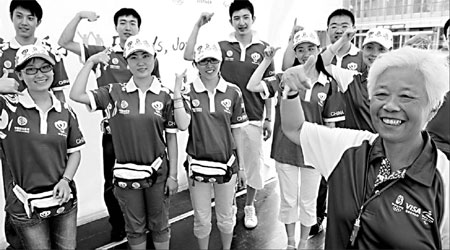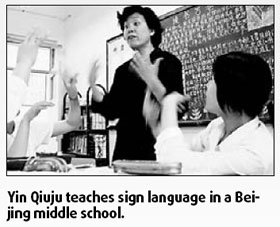
Beijing retiree Chang Zhifu (right) teaches volunteers to express the word "dream" with sign language. File photos
How does one say "sorry" to someone who can't hear or speak?
"It can get embarrassing," says Yin Qiuju, a sign-language teacher, recalling that she once saw a man pleading with a speech-and-hearing impaired couple hit by his car.
The couple refused to take the money he offered for a medical examination, and also declined his offer to take them to hospital. But they blocked his car and would not let him pass. Soon, a small crowd had gathered around them.
From the couple's sign language, Yin understood that all they wanted was for the man to say sorry. So she told this to the young man and also taught him to express his apology in sign language.
This incident made Yin realize that it is important for everyone to learn some basic sign language.
Fifty-two-year-old Yin has been a sign-language teacher at Beijing's Second Deaf-mute School for 10 years, but spends her spare time as a volunteer teaching sign language in primary and middle schools, parks, and residential communities.

"I was deeply moved by the passion shown by the Olympic volunteers recently," says Yin whose students - from 10-year-old pupils to 70-year-old grandmas, from security inspectors at railway stations to police officers at Olympic venues - are all eager to communicate and help the speech-and-hearing impaired.
With the increasing demand for learning sign language, Yin has had to rope in her colleagues at other schools in Beijing and make several teams to teach the language. "I am busy helping staff of police stations, banks and post offices communicate with their speech-and-hearing impaired clients."
Dozens of volunteers who have learned sign language, have joined Yin. Chang Zhifu is one of them. The retired worker applied to be an Olympic volunteer as early as in 2001 and has been learning sign language for six years.
"I need to become competitive compared with younger volunteers, by acquiring many skills such as English proficiency and sign language," says the 60-year-old.
Wearing "Smile Wristlets" with the five colors of the Olympic Rings and blue volunteer uniforms, Chang is a volunteer sign-language teacher at an information kiosk in the Xidan Culture Square. Using various gestures, she conveys such expressions as "welcome to Beijing", "you are wonderful" and "please provide your ID".
"I really like to help volunteers who are eager to learn some basic skills to communicate with the disabled," says Chang.
She realized her dream of learning sign language when she met volunteers from the Hongyan Sign Language Service Union from Beijing Union University, three years ago. The volunteers came to her house to teach her twice a week.
With the help of the BOCOG and the media, she has a teacher from the China Disabled Person's Federation to correct her gestures. "The language is simple, but to express it accurately is very hard," says Chang.
Chang always carries a small notebook carrying detailed descriptions of the gestures to be used for different words, to review. "Sometimes, I can't help practicing these when I am on the bus, and this has led to many people thinking I am speech-and-hearing impaired," she says.
Chang is proud that she knows all the expressions in Daily Sign Language Dialogue in China and in Sign Language for the Beijing Paralympics. She continues to teach volunteers in 30 information kiosks in Xicheng district. She also helps train university students who will be working as volunteers at the Paralympics.
Many foreign journalists are impressed by Chang and her team's work and have expressed their appreciation for the devotion shown by the volunteers. Mary Windishar, an American journalist, told Chang "you are wonderful" in the sign language she has learnt recently.
(China Daily 09/08/2008 page8)